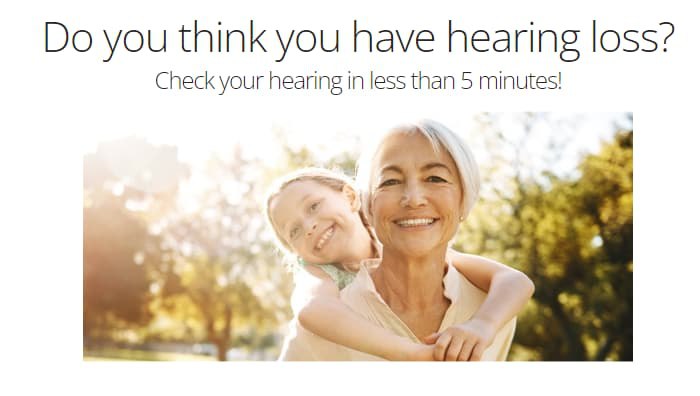Start Your Journey Toward Better Hearing
Take a quick and easy free online hearing test.

Online Hearing Test
An online hearing test measures how well you can hear different sounds and is used to determine if you may have hearing loss in as little as five minutes.
After reviewing your demographic information, the online hearing test asks you questions about how you perceive your hearing in different environments and conditions.
Next is the hearing check portion of the exam. Headphones are required and we recommend completing the test in a quiet location. A variety of tones are played through the headphones while you answer queries about each sound. The test is then repeated in your other ear.
The results of your free hearing test are separated out by ear and indicate where your hearing ability falls on a spectrum from significant loss to good hearing. This information can be used by your audiologist to order a comprehensive set of hearing tests. Once your exact type, degree and configuration of hearing loss has been determined, a treatment plan can be customized to fit your unique needs.
Benefits of Hearing Aids
Hearing aids are the most widely prescribed treatment plan for hearing loss, and for good reason. Compared to individuals who choose to live with untreated hearing loss, those who treat their loss with hearing aids report better:
- Overall health
- Professional success
- Emotional well-being
Online Hearing Test FAQ
Do I need a hearing test?
Individuals of all ages can benefit from a hearing test, even if they are not showing signs of a loss. For those under the age of 50, experts recommend visiting your audiologist for a hearing exam every 10 years. If you are over the age of 50, you should have your hearing tested every three years.
The sooner you identify a hearing loss, the quicker you can seek treatment and the better the outcome. Since hearing loss often develops slowly, the early signs are easy to miss. Having a testing schedule in place provides necessary safeguards.
Am I going deaf?
Being able to identify the early signs of hearing loss ensures you seek treatment in a timely manner to prevent a severe or profound loss. Below are the top 10 signs you may have hearing loss.
- People seem to mumble when they speak.
- You often ask people to repeat themselves.
- You experience tinnitus (ringing in your ears).
- Others complain that you are watching TV or listening to music too loudly.
- You are unable to hear everyday household sounds (e.g., ringing doorbell).
- You have trouble following conversations in a large group setting, especially when background noise is present.
- You have difficulty hearing when you are not facing the speaker.
- You have trouble understanding every word in a conversation.
- Telephone conversations are difficult for you to follow.
- Others accuse you of speaking too loudly.
Is hearing loss permanent?
Hearing loss is caused by damage to the inner, middle or outer ear.
Conductive hearing loss occurs when there are problems in the outer ear, ear canal, eardrum or middle ear. This type of hearing loss can often be corrected through surgery or medications.
Sensorineural hearing loss, often referred to as nerve deadness, occurs when there is a problem with the inner ear. This is the most common type of hearing loss and is typically permanent. Hearing aids are the preferred treatment method for this type of hearing loss.
What do I do with my online hearing test results?
An online hearing test can indicate if you may have hearing loss through a series of self-reported questions. The results should be used to prompt you to visit an audiology office, where a complete hearing exam will be performed. These tests are used to determine your type of hearing loss and measure your exact degree of damage. Your results are then used by your audiologist to create an individualized treatment plan.
For a complete hearing evaluation, please schedule an appointment with one of our audiologists today.